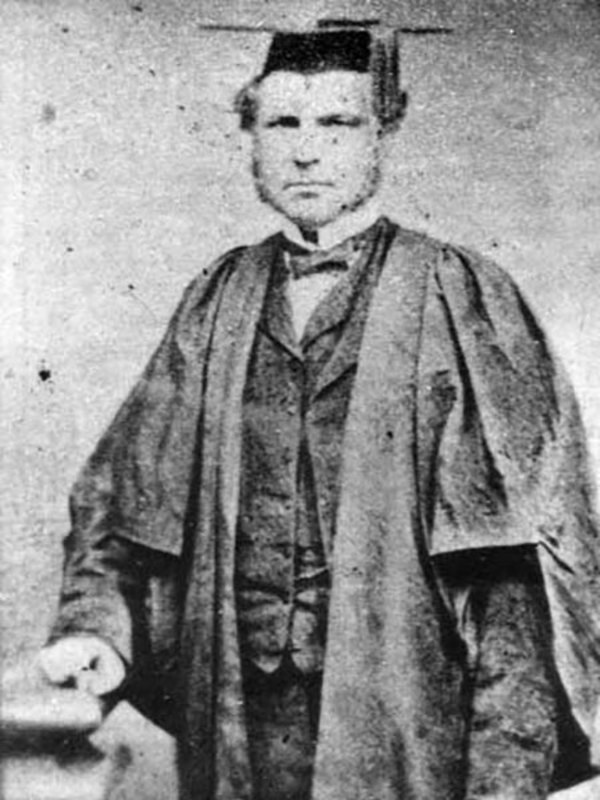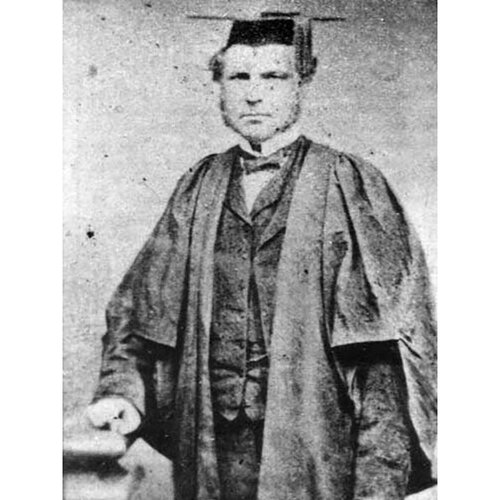
Source: Link
ISBISTER, ALEXANDER KENNEDY, HBC furtrader, educator, and lawyer; b. June 1822 at Cumberland House (Sask.), son of Thomas Isbister and Mary Kennedy; d. 28 May 1883 at Barnsbury (now part of Greater London), England.
Alexander Kennedy Isbister was born at the Hudson’s Bay Company post of Cumberland House in Rupert’s Land where his father, an Orkneyman, was employed as a clerk. His mother was the daughter of Chief Factor Alexander Kennedy and his Cree wife Aggathas. Kennedy provided that young Alexander be sent to school at St Margaret’s Hope in the Orkney Islands. The boy showed promise during his four years there, but the death of his grandfather appears to have occasioned his return to Rupert’s Land, where he attended the Red River Academy in the Red River Settlement (Man.), from 1833 to 1837.
At age 16, Isbister entered the service of the HBC at the rank of assistant postmaster and was sent to Fort Simpson (N.W.T) in the Mackenzie River District. In 1840 he helped John Bell* establish Fort McPherson (N.W.T.), on the Peel River, which for many years was the company’s most northerly post. During the following season he explored the Peel River area, and later published scientific papers based on his observations. Already, however, Isbister was beginning to chafe at his lack of advancement in the company’s service. In the 1830s the prejudices of George Simpson*, governor of the HBC, against mixed-bloods had become evident, with the result that they had little chance of being promoted to the officer class even when they possessed a good education. Isbister resigned at the beginning of the 1841 outfit and spent the rest of the season in Red River with his family before sailing to Great Britain in the fall of 1842 at the age of 20.
From 1842 to 1844 Isbister attended King’s College (University of Aberdeen), and spent the following year at the University of Edinburgh. He was described by one of his professors as a young man “of great intelligence and energy.” He excelled in chemistry, mathematics, natural history, and Greek. For a time he assisted the surgeon at the Royal Dispensary in Edinburgh, but he was soon in London to begin a remarkable career as an educator. In 1849 he was 2nd master of the East Islington Proprietary School and by 1851 was headmaster. He was appointed to Jews’ College in 1855, and three years later became the first headmaster of Stationers’ Company School. He gave distinguished service to the College of Preceptors, the supervisory body of the English teaching profession, as editor of its organ, Educational Times, for over 20 years, and as dean of the college from 1872. During his career, Isbister wrote over 20 school textbooks, principally on English grammar, arithmetic, and geometry. Somehow he also found time to further his own education; in 1858 he received an ma from the University of Edinburgh and in 1866 an llb from the University of London, becoming barrister-at-law of the Middle Temple.
Isbister’s accomplishments reveal an exceptional intellect, but he also possessed “a singularly simple and attractive manner, high character and benevolent disposition.” There is no evidence that the question of race was ever a hindrance to Isbister’s English career. Understandably, he became an ardent champion of the rights of his native countrymen whom he felt were prevented from realizing their potential because of the tyrannical monopoly imposed by the HBC in Rupert’s Land. An active supporter of the campaign for free trade rights in Red River, Isbister headed a delegation in 1847 which presented a petition against the HBC to the British government on behalf of approximately 1,000 inhabitants of Red River [see George-Antoine Bellecourt*]. He lobbied members of parliament, wrote pamphlets, and conducted an extensive correspondence with the Colonial Office, presenting evidence to support the petitioners’ claims that the company was neglecting the welfare of the Indians, as well as stifling the economic development of the colony and challenging the legal validity of the company’s charter. The colonial secretary, Lord Grey, however, accepted the company’s refutation of the charges, and after months of bureaucratic delay the issue was dropped when Isbister was informed that the responsibility and expense of proving a case against the HBC would have to be borne by the petitioners. Isbister’s hoped-for parliamentary inquiry finally came in 1857; he testified that the HBC was not governing or developing Rupert’s Land in the interests of its people. Fearful of an American takeover, he recommended that the whole area be annexed to Canada. Ever the champion of the underdog, Isbister, after the HBC signed over Rupert’s Land to Canada in 1869, supported in vain the claims of the HBC officers in the field that they were entitled to a direct share in the £300,000 compensation paid to the company.
Isbister showed his concern for education in Rupert’s Land in a practical manner. As early as 1867 he endowed a prize for the winner of an open competition among scholars from the common schools of Red River. He left a generous bequest to the fledgling University of Manitoba: his collection of nearly 5,000 books to provide the basis for “a permanent Educational Library” (unhappily most were lost in a fire in 1898) and a trust fund to establish university scholarships for “meritorious Students and Scholars in the various places of education in the Province for both sexes . . . where the highest education is given without any distinction of race, creed or nationality.”
After living for over 20 years in London, where his widowed mother and a sister joined him, Isbister moved to Barnsbury in Middlesex. His distinguished career in England had never interfered with his active interest in the development of western Canada, and especially the welfare of its native people. His concern and his generosity brought tribute to him in 1883 from the Historical and Scientific Society of Manitoba as one of the finest scions of old Manitoba.
Alexander Kennedy Isbister was the author of: A few words on the Hudson’s Bay Company, with a statement of the grievances of the natives and half-caste Indians, addressed to the British government through their delegates now in London (London, 1847); and A proposal for a new penal settlement, in connexion with the colonization of the uninhabited districts of British North America (London, 1850). Other writings are listed in the British Museum general catalogue and the National union catalog.
PAM, HBCA, B.80/a/17; B.200/b/14: ff.3, 14; C.1/935: f.40; D.4/23: f.122; D.4/24: f.5; MG 1, D2; MG 2, C1; C4. [George] Bryce, “In memoriam: late A. K. Isbister . . . ,” HSSM Trans., [8] (1883–84): 1–4. Educational Times and Journal of the College of Preceptors (London), 36 (1883): 189–90. G.B., Parl., House of Commons paper, 1849, XXXV, 227, pp.509–627, Hudson’s Bay Company (Red River Settlement) . . . ; 1857, Report from the select committee on the HBC. HBRS, XXX (Williams). DNB. Isaac Cowie, The company of adventurers: a narrative of seven years in the service of the Hudson’s Bay Company during 1867–1874 on the great buffalo plains . . . (Toronto, 1913). H. C. Knox, “Alexander Kennedy Isbister,” HSSM Papers, 3rd ser., no. 12 (1957): 17–28.
Cite This Article
Sylvia M. Van Kirk, “ISBISTER, ALEXANDER KENNEDY,” in Dictionary of Canadian Biography, vol. 11, University of Toronto/Université Laval, 2003–, accessed December 31, 2025, https://www.biographi.ca/en/bio/isbister_alexander_kennedy_11E.html.
The citation above shows the format for footnotes and endnotes according to the Chicago manual of style (16th edition). Information to be used in other citation formats:
| Permalink: | https://www.biographi.ca/en/bio/isbister_alexander_kennedy_11E.html |
| Author of Article: | Sylvia M. Van Kirk |
| Title of Article: | ISBISTER, ALEXANDER KENNEDY |
| Publication Name: | Dictionary of Canadian Biography, vol. 11 |
| Publisher: | University of Toronto/Université Laval |
| Year of publication: | 1982 |
| Year of revision: | 1982 |
| Access Date: | December 31, 2025 |



